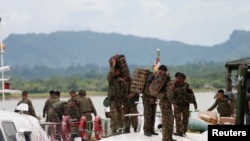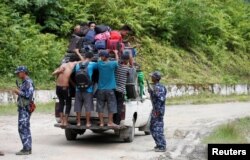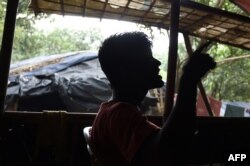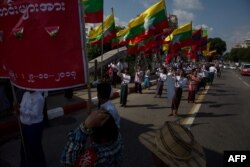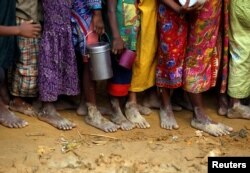Attacks by the Arakan Rohingya Salvation Army (ARSA) over the past year have raised the profile of the community’s plight in Myanmar.
But as interviews with ARSA recruits make clear, the group launched the uprising knowing it didn't have the proper firepower to score real victories on the field of battle, instead gambling that a heavy-handed response would pay off in terms of attention.
One morning several months ago, a 38-year-old religious teacher met with senior ARSA members in northern Rakhine state.
The group was new then, having emerged with attacks on border guard posts in October 2016 that killed at least nine police. The teacher, who asked to be identified as Monir Bahi, was appalled by the heavy-handed crackdown that followed. He wanted to enlist.
“I joined ARSA because the government persecuted us a lot, and ARSA said that if they always persecute us like this, and no one is standing with us, and there will be no rights for us, our lives will be gone in that situation,” Bahi said during an interview in October beside one of the refugee camps in Bangladesh's Cox's Bazar district.
Bahi is one of more than 600,000 Rohingya Muslims to have left Bangladesh after ARSA attacked for the second time on August 25.
The future for the Rohingya community is as bleak as ever. There are now more Rohingya outside of Myanmar than inside. Northern Rakhine State, where the attacks occurred, has been depopulated. Families have been shattered beyond repair.
Myanmar’s crackdown and the exodus to Bangladesh have raised the profile of the Rohingya plight while forcing the government to face questions about the long-running mistreatment of the stateless Muslim minority.
But some argue this achievement may not last in the long term.
"ARSA may feel that it has been successful in putting the global spotlight on the plight of the Rohingya, but at enormous cost,” Richard Horsey, an independent political analyst, said in an email.
“It did so by provoking the worst crisis that the Rohingya community has ever faced, and ARSA's actions have set back the cause of citizenship and rights for the Rohingya in Myanmar immeasurably - perhaps fatally.”
The status quo
ARSA supporters contend there was little other choice. The status quo was intolerable.
"To gain something, you have to lose something,” one senior commander told the Dhaka Tribune this month. “We have been dying for 70 years. At least now the world is taking notice of our deaths!”
While the world celebrated the election of Aung San Suu Kyi in 2015, the Rohingya were still without basic rights, including the right to vote in that election.
As Suu Kyi's party, the National League for Democracy, ascended to power, the U.S. lifted sanctions on Myanmar, and the Rohingya faded into the background.
Following the August 25 attacks and the military response, however, the Rohingya are now being discussed at the United Nations General Assembly, in the White House and in Congress. Secretary of State Rex Tillerson is heading to Myanmar next week, and is expected to discuss the Rohingya.
But movement on the ground is slow. Myanmar has yet to even begin a repatriation process from Bangladesh. And with thousands of houses burned down, many Rohingya have nothing to go back to.
Leaders, foot soldiers
ARSA, like previous armed factions that have sprung up in Rakhine since Myanmar’s independence in 1948, was never able to bring the same firepower as the myriad ethnic armed groups scattered across other parts of the country.
But desperation is powerful, and the Rohingya have grown increasingly desperate since 2012, when violence erupted between Buddhists and Muslims in Rakhine State. More than 140,000, mostly Rohingya, were placed in internal displacement camps, where they remain today under severe restrictions on movement.
ARSA’s leader, Ata Ullah Abu Ammar Jununi, was born to a Rohingya family in Pakistan and worked in Saudi Arabia. He left his relatively comfortable life to plot rebellion in the wake of the 2012 violence.
While analysts have raised possible links with other extremist groups, the ill-equipped nature of ARSA belies that narrative. They appear to be armed with nothing other than swords, machetes, and enough guns for a bank robbery.
The recruitment process worked in a word of mouth way. Bahi said he was given some unspecified tasks to earn trust. After several weeks, he was taken through the forest to meet with more senior leaders.
“At that time, I asked one question to them: what will we fight them with? We have nothing. If we fight them, they will kill all of us."
The response was to have faith.
“Believe in Allah and he will help us,” Bahi recalled being told. The only training he received was how to load a rifle should he steal one in a raid. He says Ata Ullah himself showed them how to do it.
He went back to his village and recruited 20 members. “We lost everything without doing anything, and they already killed us,” he said, explaining his rationale.
The uprising
A day before the August 25 attacks, Bahi said he got a call. “They said the fighting will start tomorrow and be ready,” he recalled. But he didn’t know what to be ready for, and besides, they still had no real weaponry.
He was better informed than other ARSA foot soldiers.
One 17-year-old from northern Rakhine State's Maungdaw Township named Mohamed Elias, who had joined ARSA as a lookout, said he wasn’t told about the plan at all.
"We didn’t know that the attack would happen on August 25. Maybe the top leaders knew. ARSA gave the information only to the leaders,” he said.
But once the bullets started flying on August 25, he jumped into the fight.
“We had swords, and with that we shouted and [tried to] fight back against them with the villagers. And the military shot at us and they didn’t stop,” he said. “Three of the villagers had small guns and others had swords. I was behind the gunmen. But we cannot do much because the military was shooting nonstop at us.”
VOA could not independently confirm accounts by Bahi and Elias, but they mirror accounts given by fighters who have spoken to other media outlets.
In contrast to the government narrative, Bahi said the fighting was instigated by the military. “Because of the non-stop fighting of the military, finally we came out with sticks and knives,” he said.
Pointing to scars on his face, Bahi said he was shot in the cheek and hid in the forest. He moved around in a daze before getting treatment and making it over the border.
The next step
ARSA is now in tatters. The end of a “ceasefire” they declared passed without a peep last month. An offer for peace talks was mocked. Ata Ullah has not been heard from for weeks.
Meanwhile, some refugees are expressing frustration with the group.
“Now we are very angry with them because they do not stand with us,” said Taberak Hussein, 28, while sitting in front of a makeshift store in one of the main refugee camps in Bangladesh.
Bahi’s feelings are more complicated.
He said he had lost confidence in ARSA, but he retained a glimmer of hope that they would rise again.
“I cannot feel any more about ARSA now. Because we have nothing. We were in trouble. And if we do something right now, we will face more trouble,” he said. “But if they have enough weapons, I will join with them. God Willing.”
